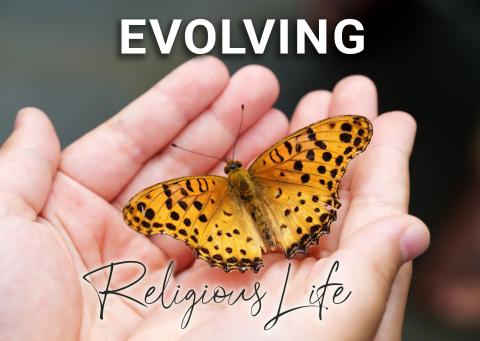
(Unsplash/Danie Franco)
Editor's note: Evolving Religious Life, a series from Global Sisters Report, explores how Catholic sisters are adapting to the realities of congregations in transition and new forms of religious life. While we often write about these trends, this particular series will focus more closely on sisters' hopes for the future.

In popular imagination, we don't usually put "gift" and "elder adulthood" in the same sentence. Our culture — youth-oriented and youth-rewarding — fosters negative views about getting old. We applaud people who work hard at "staying young." Last year, a female octogenarian was featured in the swimsuit issue of Sports Illustrated! This myopic view of growing old is demeaning and, if internalized, prevents us from discovering the richness of this time of life.
Through shared and personal experience, I am convinced that there is a very special gift in this stage of life: the invitation to journey inward. For me, an excellent example of this inner journey is captured by Augustine in his Confessions:
Late have I loved you, O Beauty ever ancient, ever new, late have I loved you! You were within me, but I was outside, and it was there that I searched for you. In my unloveliness I plunged into the lovely things, which you created. You were with me, but I was not with you. Created things kept me from you; yet if they had not been in you they would not have been at all. You called, you shouted, and you broke through my deafness. You flashed, you shone, and you dispelled my blindness. You breathed your fragrance on me; I drew in breath and now I pant for you. I have tasted you, now I hunger and thirst for more. You touched me, and I burned for your peace.
Through his extensive introspection, he came to know himself more fully and accurately and he encountered the living God.
The term "elder adulthood" is used to describe individuals who are 75 years of age or older. At this age, two realities activate this invitation to turn inward. First, by the time we reach our 75th birthday, we have begun to experience the aging process with its physical, social and psychological challenges. Many have left full-time active ministry, or soon will.
This shift surfaces a personal question: "Who am I now without the ministry that has directed and given purpose to my life?" Following closely is another question: "Who do I wish to become?" The second age-related dynamic is the realization that there are now fewer tomorrows than there are yesterdays.
If and when we take up the invitation to journey inward, we soon realize, however dimly, that there is inner work to be done.
If and when we take up the invitation to journey inward, we soon realize, however dimly, that there is inner work to be done. The work is both psychological and spiritual. The psychological task might be called "a life review" as we look back at our life and our choices. They have made us who we are and shaped our contributions to our small and larger worlds.
It's important to note that at this more mature stage in life, we are able to recognize that much of what we perceived as slights or hurts aimed at us personally were the unintended consequences of others pursuing their goals and agendas. It was never about us! Also, we can see things more clearly and be less influenced by needs to prove ourselves or be affirmed, etc.
One purpose of this inner scrutiny is to integrate dimensions of our personality that we have ignored or pushed to the sidelines because of the blinders we donned as we strove to achieve and become our ideal self. It might be the anger we felt in connection with being passed over for promotion or some desired opportunity. Or it could be the mourning or grieving that we needed to do over the many losses we suffered in the process of living our very human lives. Or it could be the forgiveness we needed to ask of a coworker whom we slighted in our efforts to accomplish and achieve.
Advertisement
A second, larger and equally important purpose psychologically is to come to some judgment or conclusion about our lives. Erik Erikson's insights about this final stage in the life cycle are illuminating. He maintains that the goal is to achieve "ego integrity." If I can say, "My life has been meaningful; it's the one and only life I could have lived," then I have accepted my life with its lack of significant regrets and feel at peace. In doing this, Erikson claims that I have a sense of integrity about my life.
If, on the other hand, I look back with feelings of regret, shame or disappointment, I will lack peace and a sense of wholeness. Not infrequently, bitterness, feeling unproductive, spending time ruminating over mistakes, and harboring feelings that life was wasted will follow. These two differing states are like the end poles of a continuum. My judgment about my life will fall someplace on the continuum, hopefully more toward the positive resolution.
The natural slowing down which accompanies aging is a necessary but not sufficient ingredient for reviewing our lives. We have to take or make time to examine our own personal story. The intent is not self-absorption, although it's possible to get sidetracked. In this regard, I have come across a helpful prayer: "Teach me to look within so that I might see beyond."
To receive both the spiritual and psychological gifts of this time in life, we need to be honest with ourselves.
The necessary second ingredient is what I term "fearless accountability" about what I see. It's common knowledge, even before the advent of social media, that we always present and see ourselves in a positive light. Our flaws and imperfections are easily rationalized out of the picture. But to receive both the spiritual and psychological gifts of this time in life, we need to be honest with ourselves.
The Persian mystic Jalaladdin Rumi's reflection on being human, "The Guest House," is apropos here and, if followed, can help us be more candid and curious in examining our lives:
This being human is a guest house.
Every morning a new arrival.
A joy, a depression, a meanness,
some momentary awareness comes
as an unexpected visitor. …Be grateful for whoever comes,
because each has been sent
as a guide from beyond.
This psychological work inevitably influences our spiritual journey, shaping how we engage with ourselves and others. As we explore this process, it's worth considering a few questions that may guide our own reflections and bring these ideas closer to home:
- What are your greatest hopes about journeying inward?
- What are your deepest fears about journeying inward?
- How might sharing your current experience help you and others?





